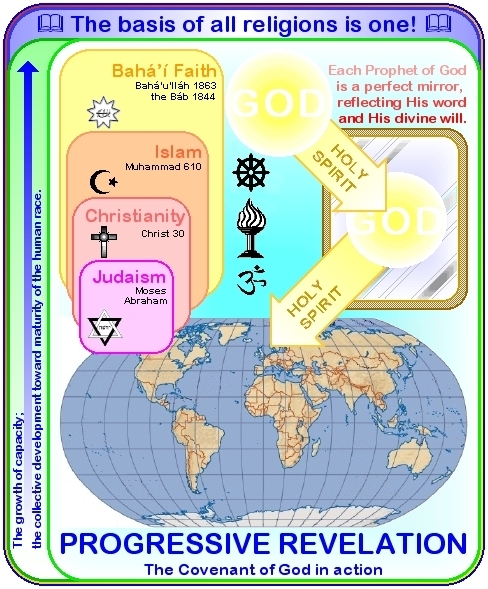The Baha’i Faith, a relatively young global religion, offers profound insights into the concept of Progressive Revelation, which is pivotal to understanding its teachings. This doctrine posits that religious truth is revealed incrementally over time by a series of divine messengers, each contributing to the spiritual evolution of humanity. Central figures like Moses, Jesus, Muhammad, and Baha’u’llah, the founder of the Baha’i Faith, are seen as part of this continuum of revelation. Yet, as devotees of this faith delve deeper into its tenets, they often encounter an intricate tapestry woven with threads from various religious traditions. The interplay between Progressive Revelation and foreign faiths presents a fascinating tableau, inviting exploration beyond superficial similarities.
At the foundation of Progressive Revelation lies the understanding that no single religious system holds monopoly over divine truth. This philosophy encourages open-mindedness, prompting adherents to appreciate the spiritual contributions of other faiths. By recognizing that each messenger has brought forth teachings suited to the time and place of their emergence, Baha’is affirm a continuity of divine guidance that transcends cultural and historical barriers. The implications of this doctrine extend well beyond mere tolerance; it fosters a genuine reverence for the unique paths taken by diverse spiritual traditions.
Embarking on the exploration of this notion unveils a tapestry threaded with both overt and nuanced connections among religions. For instance, many teachings shared between major world religions, such as the Golden Rule— “Do unto others as you would have them do unto you”— underscore a universal ethical framework. This convergence offers fertile ground for examining how the Baha’i perspective encourages interfaith dialogue, advocating that the essence of all faiths is not so dissimilar but rather a manifestation of an overarching divine purpose.
Moreover, the Baha’i teachings underscore the importance of unity in diversity. This is particularly evident in the context of religious plurality. The concept of Progressive Revelation not only allows Baha’is to appreciate their faith but also inspires admiration for foreign faiths. For example, the emphasis on the oneness of humanity is a recurring theme across many religions. Baha’is interpret such commonalities as reflections of the same divine source, thus reinforcing their commitment to the principles of tolerance and acceptance in a world often fraught with divisiveness.
Contrast is also a significant aspect of this exploration. While some may view religious exclusivity as a source of strength, Baha’is counter with the notion that the new teachings build upon and fulfill the previous revelations. Such a perspective claims a transformative power embedded within the faith of Jesus that culminated in the teachings of Baha’u’llah. In this context, rather than seeing foreign faiths as competitors, Baha’is deliberate on how each contributes to a larger understanding of the divine plan. This philosophical lens sheds light on why Baha’is often engage earnestly in dialogues with adherents of other faiths, seeking to learn and share in the radiant truths evident across traditions.
A curious intersection presents itself when examining the reactions of individuals encountering Baha’i teachings. For many, the concept of Progressive Revelation resonates on a personal level. On an intellectual echelon, it addresses a longing for inclusivity and an appreciation of the complexity of the human experience. Conversely, on a metaphysical level, it hints at an innate pursuit for understanding a multi-faceted divine truth. The fascination often stems from an awareness that these shared truths among foreign faiths can lead to enlightenment, fostering a sense of kinship that transgresses temporal cultural boundaries.
The interaction with foreign faiths also exemplifies a pedagogical opportunity for Baha’is. Engaging with the narratives and customs of other religions, they not only fortify their own understanding of their beliefs but also cultivate emotional intelligence and spiritual maturity. There exists an inexorable relationship where the exposure to the intricacies of faiths such as Buddhism, Hinduism, and Sikhism can augment a heightened awareness of one’s spirituality. This quest for enlightenment inherently strengthens community bonds as individuals collectively strive for a more profound comprehension of their experiences through collaboration and mutual respect.
Challenges and critiques inevitably arise, particularly among those who perceive the melding of foreign faiths into the Baha’i framework as diluting purity or essence. This skepticism invites Baha’is to engage thoughtfully with detractors, emphasizing that juxtaposition does not equate to erosion. Instead, it reinforces the underlying tenet of Progressive Revelation. By illuminating this richness, followers may clarify misconceptions, enabling broader acceptance and appreciation of the Baha’i principles. Such dialogue potentially cultivates a more substantial interest in Baha’i texts and teachings, revealing less of a monolithic stance and more of a symphonic coexistence of varied, enriched perspectives.
As global societies continue to grapple with issues ranging from conflict to cultural disintegration, the Baha’i teachings on Progressive Revelation emerge as a salient framework for addressing these divides. The acknowledgment of a divinely orchestrated progression invites a collective awakening, encouraging seekers of truth across all faiths to unify. The veneration of divine messengers heralds a new era for dialogues, providing a sturdy bridge over troubled waters. The ascendance of interfaith understanding through the lens of Baha’i teachings stands as both a beacon of hope and an indelible reminder of humanity’s shared spiritual journey.
In conclusion, the examination of Baha’i teachings with regard to Progressive Revelation in the context of foreign faiths reveals a rich, complex narrative that transcends mere religious dogma. It invites the ardent seeker to delve into a greater appreciation of the nuances present in various spiritual traditions while remaining grounded in a framework that celebrates the unfolding nature of divine revelation. Through this lens, connections are not mere coincidences; they are the harmonious echoes of a collective yearning for truth, unity, and love that resonate across the landscape of human experience.
